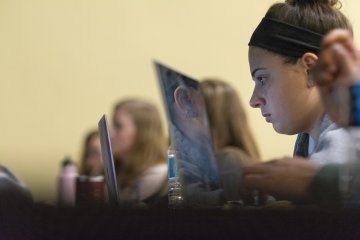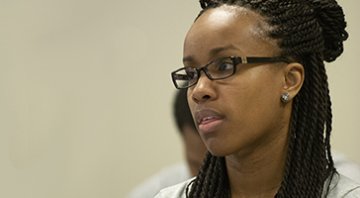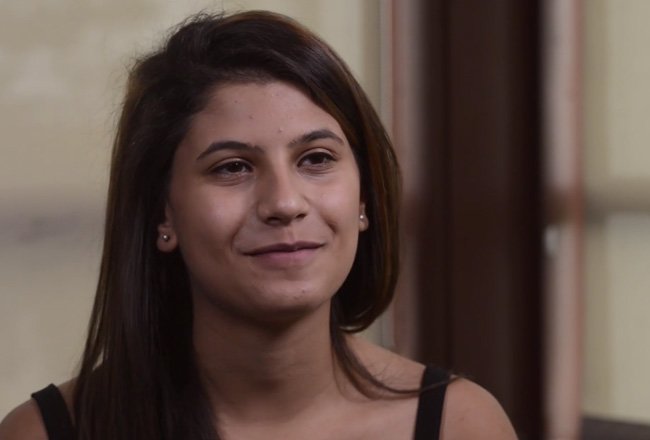
Psychology
About This Program
You’re intrigued by the way people think. You’re curious about the complex connection between the brain and human behavior. You’re naturally observant and analytical, and interested in studying social interactions from a scientific perspective. Psychology may be the right major for you.
Department
Why Utica University
The psychology major at Utica University provides a broad foundation in a discipline that applies to a variety of professional areas. It is a versatile program that enables students to gain a deeper insight into human behavior and the scientific method. With a highly accomplished faculty and excellent facilities for the study of behavior, the major in psychology offers a strong emphasis on research and numerous opportunities to gain field experience.
Papers, posters, and conference presentations
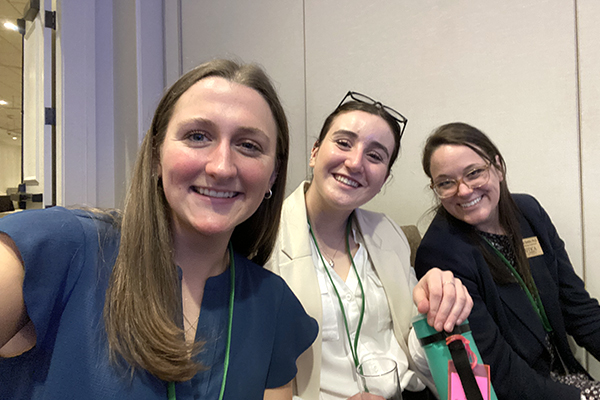
Listed below are examples of student-faculty collaborative scholarship in Utica University's psychology major from the year 2000 to the present.
(Note: student co-authors appear in bold-face)
Schwoebel, J., Pratt, G. R., Brinck, M. L., & Zulager, M. (2025, March 6-8). Is there a cure for zoning out while reading? [Paper presentation]. 96th Annual Meeting of the Eastern Psychological Association, New York, NY.
Yanowitz, J.L., Laughlin, L & Donohue, K. (2025, March). A Qualitative Examination of Littles: Dynamics of Power, Sexuality, and Therapeutic Potential. Paper presented at the annual conference of the Eastern Psychological Association, New York, NY.
Lundquist, A.R., & Johnson, H. (2024). The Covid Generation: How a Pandemic Changed the Way Colleges Students Relate to Themselves and Others. Proceedings of the 38th International RAIS Conference on Social Sciences and Humanities, USA, ISSN 2578-8574, https://rais.education/proceedings-of-the-38th-rais-conference/
Lundquist, A.R., & Johnson, H. (2024, July). The Covid Generation: How a Pandemic Changed the Way Colleges Students Relate to Themselves and Others. Paper presented at the 38th International RAIS Conference on Social Sciences and Humanities, American University. Washington D.C., United States
Yanowitz, J.L., Donohue, K., & Laughlin, L. (2024, July). An exploratory phenomenological analysis \ of the lived experience of littles. Poster presented to the annual conference of the International Association of Relationship Research, Boston, MA.
Seddio, K., Blaszka, A, & Quinn, M. (2024, March). Highway to Empathy: Narrative Transportation Drives Prosocial Emotional Transference Among College Adults. Paper presented at the Eastern Psychological Association annual conference, Philadelphia, PA.
Pollack, D. L., Broudy, C. A., Coon, T. W., & Franco, D. R. (2023, October 16). The holding space: An experiential–dynamic group therapy for mothers with postpartum anxiety and depression. Group Dynamics: Theory, Research, and Practice. https://dx.doi.org/10.1037/gdn0000205
John Schwoebel, Cassandra Chalon, Christopher Marleau, and Evan Stevens (2023).Back to the future: An episodic specificity induction impacts the impact bias. Paper presented at the Eastern Psychological Association; Boston, MA.
Aana Blaszka and Kaylee Seddio (2023). Gender differences and the role depression plays in the expression of empathy. [Poster presentation]. Eastern Psychological Association; Boston, MA.
Mary Quinn and Kaylee Seddio (2023). Empathic concern and moral care: Implications for healthcare professionals. [Poster presentation]. Eastern Psychological Association; Boston, MA.
Tyson C. Kreiger & Angeline M. Viti (2023) The relationship of plant awareness disparity to environmental awareness and personality. Paper presented at the Eastern Psychological Association; Boston, MA.
Franco, D., Pollack, D., Sawyer, C., & Przygoda, S. (2022, October). Adapting the helpful aspects of therapy form for semi-structured qualitative psychotherapy process interviews. [Poster presentation] New York State Psychological Association 2022 convention (online), October 22-23, 2022.
Seddio, K., Pollack, D., Lewis, J., & Crawford, H. (2022, in-press). Attention-Deficit/Hyperactivity Disorder (ADHD) and anxiety during the COVID-19 Pandemic: Implications for internalizing behaviors in college students. Journal of American College Health.
Lewis, J., Seddio, K. and Pollack, D. (2022). The relationship between anxiety severity and ADHD symptoms among college students. [Poster presentation]. Eastern Psychological Association, New York City, NY.
Lundquist, A.R., & Hayden, S.C. (May, 2022). From passive participation to active engagement....and back [Poster presentation] Association for Psychological Science, Chicago, IL.
Specht, S. M., Marleau, C. M. & Pryzgoda, S. A. (2022). The relationships between central human capabilities and psychological well-being. Paper presented at the Eastern Psychological Association; New York, NY.
Birnie, M., & Schwoebel, J. (2022). A society dressed in sexism: Effects of rape type on blame [Poster presentation]. Eastern Psychological Association, New York City, NY.
Schwoebel, J., Yudchits, J., & DeRocher, G. (2022, March 3-5). Retrieval practice enhances memories of the future [Poster presentation]. Eastern Psychological Association, New York City, NY.
Kreiger, T. C., Viti, A. M., & Mullinax, E. N., (2022, March). Student engagement and educational barriers in the era of COVID-19: “The Kids are Not Alright.” Paper presented at Eastern Psychological Association, New York.
Lewis, J., Seddio, K. & Pollack, D. (2021). Anxiety and ADHD during a pandemic: Predicting comorbidity [Poster presentation]. Eastern Psychological Association, Virtual.
Seddio, K., Yates, T., Birnie, M., Lewis, K., & Zaleski, J. (2021, November). When bad does good: Expanding human rights education through empathy with atrocity survivors. Paper presented at the Association for Moral Education.
Seddio, K., Yates, T., Birnie, M., Lewis, J., & Zaleski, J. (2021, May). Emotional arousal and visual attention: An eye-tracking study defining human rights and moral foundations. [Poster presentation]. Association for Psychological Science.
Seddio, K., Pollack, D., Lewis, J., & Crawford, H. (2021, October). Anxiety and Attention-Deficit/Hyperactivity Disorder among college women: The mediating role of internalizing behaviors. Paper presented at the New York State Psychological Association.
Schwoebel, J., Buko, D., & Caissey, K. L. (2021) Evidence for reinstating diverse episodic contexts in retrieval-based learning, Journal of Cognitive Psychology. Advance online publication. https://doi.org/10.1080/20445911.2021.2008946
Schwoebel, J., Caissey, K. L. (2021, March 5-6). Smartphone dependence and settings during remote lectures: The sound of silence [Poster presentation]. Eastern Psychological Association, Virtual.
Schwoebel, J., Edwards, S., Robinson, K., & Caissey, K. (2020). Why does retrieval practice improve memory? [Poster presentation]. Eastern Psychological Association, Boston, MA.
Kreiger, T. C., Marshall, A. F, & Mullinax, E. N. (2020). Student perceptions of midterm grades. Paper presented at the Eastern Psychological Association, Boston, MA.
Specht, S. M., Riddle, C. R. and Taylor, J. E. (2020).Ordinal assessment of Nussbaum’s “central human capabilities” by younger and older adults. Paper presented at the Eastern Psychological Association, Boston, MA.
Kreiger, T. C., Mendoza, A. T., Smith, A. W., Regan, K. A., Badbjevic, A., & McDermott C. M. (2019). Engaged for success? Student use of traditional and institution-based academic support. Paper presented at the meeting of the Eastern Psychological Association, New York, NY.
Kreiger, T. C., Smith, A. W., Regan, K. A. (2019) Keeping the job and buying the stuff: Understanding the nature of “Adulting”. Poster presented at the meeting of the Eastern Psychological Association, New York
Mendoza, A. T., Kreiger, T. C., McDermott C. M., Smith, A. W., & Regan, K. A. (2019). First-generation college students: Understanding their educational barriers, grit, and motivation. Paper presented at the meeting of the Eastern Psychological Association, New York, NY.
Rohacek, A. and Lindsey A. E. (2019). Psychophysical assessment of contrast sensitivity functions in the sighted and hybrid forms of the Mexican Tetra fish. Poster Presentation at the Vision Science Society, St. Pete Beach, FL.
Shove, J. C. (2019). Evidence of co-rumination in a social media platform. [Poster presentation] Eastern Psychological Association, New York, NY.
Schwoebel, J. & Regan, K. A. (2019). Enhancing recall: The role of reinstating episodic contexts in retrieval-based learning. Paper presented at the meeting of the Eastern Psychological Association, New York, NY.
Schwoebel, J., Gawel, B. L., & Buko, D. A. (2019). Imagination: The role of reinstating episodic contexts in retrieval-based learning. [Poster presentation] Eastern Psychological Association, New York, NY.
Rohacek, A. & Schwoebel, J. (2019). Your decisions matter! Teaching intervention improves decision making. [Poster presentation] Eastern Psychological Association, New York, NY.
Specht, S. M. and Buko, D. A. (2019). Meaning in life, the “small self”, and liking of artwork. [Poster presentation] Eastern Psychological Association, New York, NY.
Schwoebel, J., Depperman, A. K., & Scott, J. L. (2018). Distinct episodic contexts enhance retrieval-based learning. Memory 26(9), 1291-1296. doi: 10.1080/09658211.2018.1464190
Kreiger, T. C., Smith, A and Badnjevic, A. (2018). Leading a horse to water: Examining student Use of academic services. Paper presented at the Annual Meeting of the Eastern Psychological Association. Philadelphia, PA.
Schwoebel, J., Shove, J. C., Pope, A. S., and Smith, Jr., T. W. (2018). Why does retrieval in varied environmental contexts enhance learning? [Poster presentation] Eastern Psychological Association. Philadelphia, PA.
Specht, S. M., Taurisano, A. R., Petronella, B. J. and McKinnon, S. A. (2018). Dispositional awe, “The small self” and art appreciation. [Poster presentation]. Eastern Psychological Association. Philadelphia, PA.
Kupris, A. & Yanowitz, J. L. (2017). Perception of infidelity as a function of participant’s gender and previous infidelity experience. [Poster presentation]. Association for Psychological Science, Boston, MA.
Yanowitz, J. L. and Kupris, A. (2017). Perception of infidelity as a function of gender and justification. [Poster presentation]. Association for Psychological Science, Boston, MA.
Kreiger, T. C. and Scott, J. L. (2017). The relationship between levels of student nostalgia, authenticity, and college adjustment. [Poster presentation] Eastern Psychological Association, Boston, MA.
Rohacek, A. and Lindsey A. E. (2017). Terrestrial phase Tiger Salamanders have increased visual acuity compared to aquatic phase Tiger Salamanders. [Poster Presentation]. Association for Psychological Science, Boston, MA.
Schwoebel, J., Depperman, A. K., and Scott, J. L. (2017). Distinct temporal and environmental contexts enhance retrieval-based learning: How to effectively cram for an exam. [Poster presentation]. Association for Psychological Science, Boston, MA.
Coniguliaro, S. and Kreiger, T. C.(2016). Personality and imaginary audience. [Poster presentation] Eastern Psychological Association. New York, NY.
Schwoebel, J. & Wadas, B. T. (2016). Improving long-term memory: The role of retrieval practice in different contexts. Paper presented at the Eastern Psychological Association. New York, NY.
Schwoebel, J., Pallas, B. & Dalton, A. (2015). Retrieval-based learning: Distinct retrieval practice contexts enhance long-term retention. [Poster presentation]. Eastern Psychological Association. Philadelphia, PA.
Gibb, B. J. & Specht, S. M. (2015). The counterintuitive relationship between scores on the Southampton Nostalgia Scale and open-ended nostalgic responses. [Poster presentation] Eastern Psychological Association. Philadelphia, PA.
Arcuri, A. R. & Specht, S. M. (2015). Gender differences in attractiveness ratings of same- and different-gender photographs. [Poster presentation] Eastern Psychological Association. Philadelphia, PA.
Kreiger, T. C. & Coniguliaro, S. (2015). The appeal of being real: Gender differences in the components of state authenticity. [Poster presentation]. Eastern Psychological Association. Philadelphia, PA.
Kreiger, T. C., Fadden, D. L., Rosbrook, K. Y. & Specht, S. M. (2014). Death and sports: Neglected components of contemporary measures of nostalgia. [Poster presented]. Eastern Psychological Association. Boston, MA.
Lundquist, A.R., Lefebvre, E.J., & Garramone, S.J. (2014). Smartphones: Fulfilling the need for immediacy in everyday life, but at what cost? International Journal of Humanities and Social Sciences, 4, 80-89.
Lundquist, A. R., Lefebvre, E.J., & Garramone, S.J. (2014). Smartphones: Fulfilling the need for immediacy in everyday life, but at what cost? Paper presented at the annual meeting of the Eastern Psychological Association, Boston, MA.
Lindsey, A., Corelli, M., Vomer, M. & Massey, A. (2013). A psychophysical method for the measurement of contrast sensitivity in tiger salamanders. [Poster presentation] Association of Psychological Sciences Conference. Washington, DC.
Lundquist, A. R., & Garramone, S.J. (2013). Call me, text me, e-mail me…wherever I am! Paper presented at the annual meeting of the Southern Humanities Council, Savannah, Georgia.
Wadas, M. J., *Scalise, A. M., Rivera, A. J., and Lindsey, A. E. (2011). Tiger salamanders are more sensitive to higher spatial frequencies and less sensitive to red/green visual stimuli following metamorphosis from aquatic into terrestrial phase. Investigative Ophthalmology & Visual Science, 52, E-Abstract 1176.
Yanowitz, J.L., Broedel, M., & Yanowitz, K.L. (2011). Perceptions of courtship pursuit as a function of age. [Poster presentation]. Association for Psychological Science, Washington, D.C.
Specht, S. M. & Wilkinson, T.N. (2010). The role of “nostalgia” in perception of artwork. [Poster presentation]. Association of Psychological Science. Boston, MA.
Wadas, M. J., Scalise, A. M. & Lindsey, A. E. (2010). Psychophysical measurement of visual Behavior in the aquatic-phase tiger salamander. [Poster presentation]. Association of Psychological Science. Boston, MA.
Lindsey, A. E., *Politylo, B. C., & Rivera, A. J. (2009). Psychophysical measurement of color vision in neotenic tiger salamander. Investigative Ophthalmology & Visual Science, 50, E-Abstract 2734.
Specht, S. M. & VanDewerker, E.N. (2008). The influence of artists' statements on perceptions of artwork. [Poster presentation] 20th Congress of the International Association of Empirical Aesthetics. Chicago, IL.
Lindsey, A., Abdul-Salaam, O. Z., & Danilowicz, R. (2007). Behavioral Contrast Sensitivity Functions in the Neotenic Tiger Salamander [Abstract]. Investigative Ophthalmology & Visual Science, 48, E-Abstract 1301. [Poster presentation] Annual Conference of the Association for Research in Vision and Opthalmology. Ft. Lauderdale, FL.
Specht, S. M., Owens, G. W. & Lundquist, A. R. (2007). Experimentally-induced "color-blindness" and perception of artwork. [Poster presentation]. Association of Psychological Science. Washington, DC.
Specht, S. M. & Freeman, S. L. (2006). Histaminergic antagonists appear to shift water intake patterns in humans. [Poster presentation]. Association of Psychological Science. New York, NY.
Specht, S. M. & Poczatek, J. E. (2005). Successive contrast effects for judgments of abstraction in artwork. Paper presented at the Eastern Psychological Association. Boston, MA.
Specht, S. M. & Cook, M. J. (2004). Kandinsky and “the Blues”: Chromatic associations with varying shapes. [Poster presentation]. Midwestern Psychological Association. Chicago, IL.
Ginsberg, P.E. & Gekonge, M. (2004). MTV, technology, the secular trend, and HIV/AIDS: Why African parents need to learn about adolescent development. Dialectical Anthropology, 28, 353-364.
Alibegic, R. & Ginsberg, P. (2004). Can ethnic identity predict preference for magazine images in Bosnian adolescents. [Poster presentation]. Eastern Psychological Association. Washington, DC.
Lundquist, A. R. & Asher, E. (2004). Self-determination predicts better coping with academic success impediments in college. [Poster presentation]. American Psychological Society. Chicago, IL.
Lundquist, A. R. & Curtis, M. (2004). Effectiveness of on-line versus traditional study material in an Introductory Psychology course. [Poster presentation]. American Psychological Society. Chicago, IL.
Ginsberg, P. E. & Lemire, D. (2003). Identity formation in Bosnian adolescent refugees. [Poster presentation]. Eastern Psychological Association. Baltimore, MD.
Ginsberg, P.E. & Gekonge, M. (2003). MTV, the secular trend, and HIV/AIDS: Why African parents want to learn about adolescent development. Paper presented at the New York African Studies Association. Ithaca, NY.
Specht, S. M., Alberico, K. F., Maher, J. D. and Mastrangelo, L. E. (2003). Immediate and delayed taste contrast in younger and older adults. Paper presented at the 25th Annual Meeting of the Association for Chemoreception Sciences, Sarasota, FL.
Bauer, L. & Fragetta, C. J. (2002). Memory distortions in the courtroom: Putting memory on trial. In R. W. Flint, Jr. (Ed.), Forget It? Sources, Theories, and Mechanisms of Alterations in Mnemonic Function (pp. 51-78). North Chelmsford, MA: Erudition.
Foll, C. (2001). The influence of word relavence and multimodal presentation on recall. [Poster presentation]. Eastern Psychological Association. Washington, DC.
Specht, S. M., Markiewicz, G. J. & Nardilillo, K. D. (2001). Successive taste contrast in humans using common foodstuffs as gustatory stimuli. Paper presented at the Eastern Psychological Association, Washington, DC.
Waterman, J. (2001). Effects of the media on the perception of current and ideal body image. [Poster presentation] Eastern Psychological Association. Washington, DC.
Martin, P. (2000). The relationship of locus of control to health and coping strategies during midterms. [Poster presentation]. Eastern Psychological Association. Baltimore, MD.
Practicum placement sites:
- Utica City School District
- Marcy Corrections
- Samaritan Counseling Center of the Mohawk Valley
- The Neighborhood Center
- Helio Health
- Business Insight Works
- The Neighborhood Center
- Sherrill School District
- The Kelberman Center
- Upstate Caring Partners
- SUNY Upstate Medical University
- Center for Family Life and Recovery
Contact Information
Office of Admissions
Amy Lindsey, Ph.D.
General Information
Psychology at Utica
…I think that effective solutions have to be based upon facts—have to be based upon reason—have to be based upon logic…
What You'll Learn
The psychology program at Utica offers two degree options: Bachelor of Arts and Bachelor of Science. All of the traditional subdisciplines of psychology are taught, including developmental, social, learning/cognitive, biopsychology, clinical/counseling, and experimental methodology and analysis. This curriculum provides a broad background in psychology for those intending to pursue advanced studies, and general liberal arts education for students wishing to seek more immediate employment.
- Knowledge: Know major concepts in the major subfields of psychology (i.e., clinical, developmental, social, cognitive, neuroscience)
- Statistics: Apply statistical inference and statistical reasoning to problems in psychology
- Scientific Methods: Use scientific methods to evaluate or conduct sound research in psychology
- Communication: Communicate psychological concepts clearly and effectively in writing
- APA Style: Use American Psychological Association style and construct written reports conforming to APA style

Psychology Faculty

- Associate Professor of Psychology

- Associate Professor of Psychology

- Professor of Psychology

- Associate Professor of Psychology

- Associate Professor of Psychology

- Associate Professor of Psychology

- Associate Professor of Psychology
Psychology at Utica University
A Degree That Works
The psychology major prepares you for professional accomplishment in:
- Mental Health Services
- Assistance for individuals with developmental disabilities
- Crisis management and substance abuse intervention
- Business Management

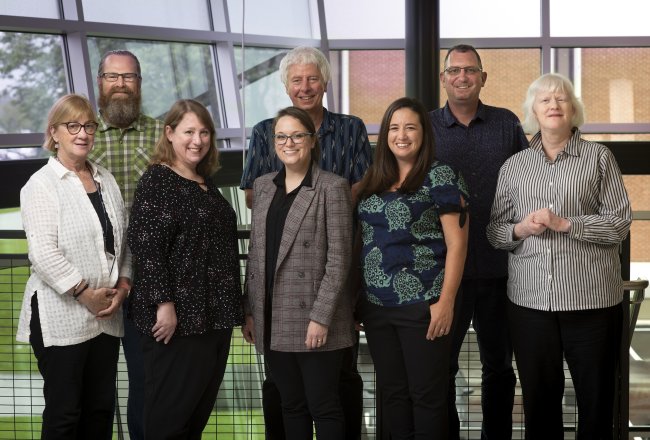
Exceptional Faculty
The dedicated faculty of the Utica University Psychology Department is committed to your success. With an unparalleled knowledge and expertise, they are accessible, easy to know, and fun to work with.
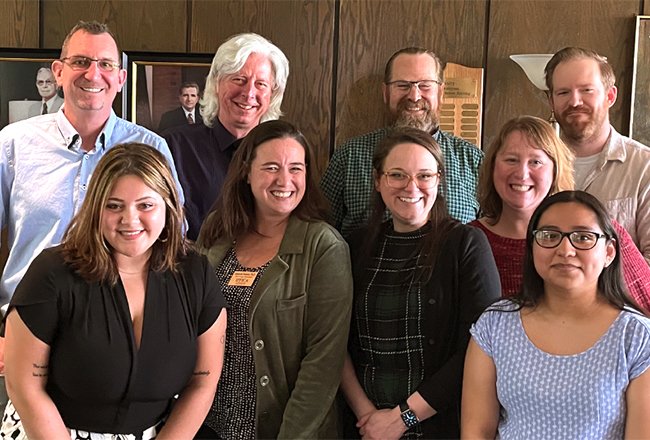
A Year To Remember
This brief retrospective takes a look back at a year (2022-23) in the life of the Utica University Psychology Department in photos, featuring conference presentations and other student/faculty achievements.
View Presentation
A Solid Foundation
All of the traditional subdisciplines of psychology are taught, including developmental, social, learning/cognitive, biopsychology, clinical/counseling, and experimental methodology and analysis.
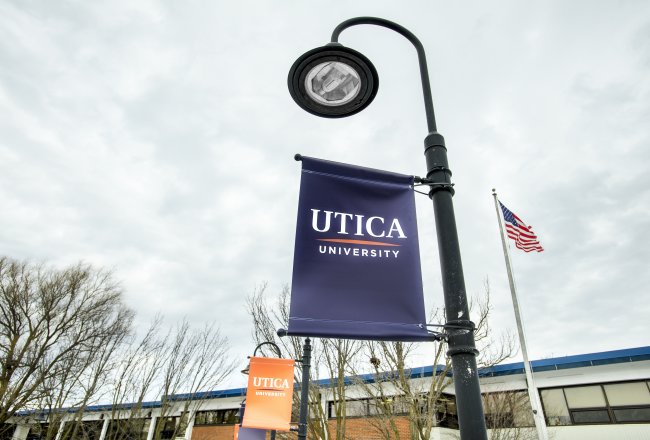
Laboratory Facilities
On-campus facilities supporting the study of psychology at Utica University include the Abe Judson Memorial Psychology Lab, with advanced statistical and stimuli software on all computers.

International Honors
Psi Chi is the International Honor Society in Psychology founded for the purpose of encouraging, stimulating, and maintaining excellence in scholarship, and advancing the science of psychology. Psychology majors at Utica University who excel in their coursework and meet the requirements are invited to join Psi Chi. Students are considered every semester and those who achieve this honor are invited to our annual Induction Ceremony each Spring semester.
PSI CHIStudent Voices: Raneem Amra
A brief conversation with psychology major Raneem Amra, an international student from Palestine, about her program and her experience at Utica.
Student Voices: Kate Rosbrook
A visit with psychology major Kate Rosbrook, who was selected for a research assistantship at Yale School of Medicine’s John B. Pierce Laboratory substantially on the basis of the high-level skills and abilities she developed at Utica University.

Psychology Society
Psych Society welcomes all students interested in exploring psychological questions, becoming engaged in applying psychology to have a positive impact on campus and beyond, and joining a supportive group to have fun and pursue common interests in psychology!


